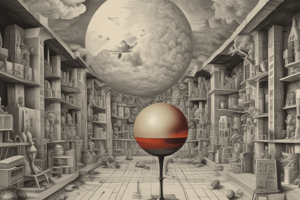Podcast
Questions and Answers
What distinction did Robert Keohane make in his assessment of the field?
What distinction did Robert Keohane make in his assessment of the field?
- Empiricists versus Theorists
- Critical theorists versus Traditionalists
- Postmodernists versus Modernists
- Rationalists versus Reflectivists (correct)
Why did Keohane criticize the critical approaches represented by reflectivists?
Why did Keohane criticize the critical approaches represented by reflectivists?
- For failing to meet social scientific rigor (correct)
- For lacking political relevance
- For relying heavily on classical theories
- For being too focused on empirical research
What was a common response from critics regarding postmodernist thought?
What was a common response from critics regarding postmodernist thought?
- They viewed it as an inherent threat (correct)
- They likened it to realist perspectives
- They argued it was too simplistic
- They embraced its frameworks
Which term has been frequently used to capture the response to critical approaches in IR by traditionalists?
Which term has been frequently used to capture the response to critical approaches in IR by traditionalists?
What misconception did critics have regarding the questioning of foundations in critical approaches?
What misconception did critics have regarding the questioning of foundations in critical approaches?
What does the vehement reaction to theoretical contests suggest about the underlying issues in the field?
What does the vehement reaction to theoretical contests suggest about the underlying issues in the field?
Which of the following criticisms was specifically directed at postmodernists?
Which of the following criticisms was specifically directed at postmodernists?
In what way did critics misinterpret critical theorists' arguments about foundations?
In what way did critics misinterpret critical theorists' arguments about foundations?
What is a key methodological feature of poststructuralism in international politics?
What is a key methodological feature of poststructuralism in international politics?
How do dominant interpretations of international relations tend to be characterized?
How do dominant interpretations of international relations tend to be characterized?
Which aspect does not typically represent a poststructural approach to identity in international relations?
Which aspect does not typically represent a poststructural approach to identity in international relations?
What major theme connects discourse, power, and identity in Foucault's approach?
What major theme connects discourse, power, and identity in Foucault's approach?
Which statement accurately reflects the challenges faced when interpreting international politics?
Which statement accurately reflects the challenges faced when interpreting international politics?
What perspective is often suggested about the 'we' who interpret world politics?
What perspective is often suggested about the 'we' who interpret world politics?
Which concept is not typically associated with the politics of identity in international relations?
Which concept is not typically associated with the politics of identity in international relations?
What is often a result of dominant interpretations in international relations?
What is often a result of dominant interpretations in international relations?
What is a primary characteristic of poststructuralism in relation to traditional paradigms in International Relations (IR)?
What is a primary characteristic of poststructuralism in relation to traditional paradigms in International Relations (IR)?
How does poststructuralism relate theory and practice?
How does poststructuralism relate theory and practice?
What does poststructuralism emphasize in its exploration of global affairs?
What does poststructuralism emphasize in its exploration of global affairs?
In what way does poststructuralism relate to politics of identity?
In what way does poststructuralism relate to politics of identity?
What kind of questions does poststructuralism pose regarding knowledge?
What kind of questions does poststructuralism pose regarding knowledge?
How is poststructuralism similar to critical theory?
How is poststructuralism similar to critical theory?
What aspect of representation does poststructuralism address?
What aspect of representation does poststructuralism address?
Why is poststructuralism considered a critical attitude?
Why is poststructuralism considered a critical attitude?
Flashcards
Poststructuralism in IR
Poststructuralism in IR
A critical approach in International Relations focused on representation, power-knowledge relationships, and identity politics, rather than a formal paradigm.
Poststructuralism's Approach
Poststructuralism's Approach
It asks critical questions about knowledge production, who has knowledge, and how different ways of knowing are established over time.
Poststructuralism's Nature
Poststructuralism's Nature
Poststructuralism is a critical attitude, not a theory.
Theory as Practice (Poststructuralism)
Theory as Practice (Poststructuralism)
Signup and view all the flashcards
Poststructuralism's Roots/Influence
Poststructuralism's Roots/Influence
Signup and view all the flashcards
Rejection of Competing Paradigms
Rejection of Competing Paradigms
Signup and view all the flashcards
Power & Knowledge Relation
Power & Knowledge Relation
Signup and view all the flashcards
Representation & Politics
Representation & Politics
Signup and view all the flashcards
Interpretation in IR
Interpretation in IR
Signup and view all the flashcards
Dominant IR Interpretations
Dominant IR Interpretations
Signup and view all the flashcards
Discourse in Poststructuralism
Discourse in Poststructuralism
Signup and view all the flashcards
Subjectivity in Poststructuralism
Subjectivity in Poststructuralism
Signup and view all the flashcards
Representation in IR
Representation in IR
Signup and view all the flashcards
Methodological Features in Poststructuralism
Methodological Features in Poststructuralism
Signup and view all the flashcards
Case Study: Humanitarian Crises
Case Study: Humanitarian Crises
Signup and view all the flashcards
Meta-theoretical critiques of realism
Meta-theoretical critiques of realism
Signup and view all the flashcards
'Postmodern' label application
'Postmodern' label application
Signup and view all the flashcards
Rationalists vs. Reflectivists
Rationalists vs. Reflectivists
Signup and view all the flashcards
Social scientific rigor
Social scientific rigor
Signup and view all the flashcards
Postempiricist developments in philosophy
Postempiricist developments in philosophy
Signup and view all the flashcards
Historical production of foundations
Historical production of foundations
Signup and view all the flashcards
Rejecting all foundations
Rejecting all foundations
Signup and view all the flashcards
Epistemologies
Epistemologies
Signup and view all the flashcards
Study Notes
Poststructuralism in International Relations
- Poststructuralism is an interdisciplinary approach, not a paradigm or theory
- It's a critical attitude, exploring assumptions of global politics
- Poststructuralism focuses on representation, power, and knowledge in global politics
- It questions how the world is 'mapped' and understood
- Interpretation, mapping, and meta-theory are crucial elements to understanding international politics
- Every way of understanding global politics relies on interpretation, representation, and abstraction.
- This is because 'the world' isn't presented in already-made categories or theories.
Introduction
- International relations (IR) discipline depends on representation, interpretation, mapping, and meta-theory.
- There are existing dominant interpretations of the world (states, interest, etc.)
- IR often employs a Western (white, male, affluent) perspective, affecting how the world is perceived
- The relationship between knowledge and power is a central concern
Michel Foucault
- Poststructural perspective is found in many thinkers
- Focuses on "limit attitude," which means questioning perceived limits of thought
- Foucault criticizes the constraints on human thought and practice
- Critique, for Foucault, is a positive process for changing assumptions about human actions and structures, not an inherently negative endeavor.
- This attitude is emancipatory by exploring limits to reshape perspectives and understandings.
The Critical Attitude of Poststructuralism
- It is an approach, not a theory
- It challenges traditional IR approaches
- Its goal is not to eliminate exclusion, but understand how it operates, and the consequences.
- Poststructuralism emphasizes power relations, specifically how those relations produces particular identities and knowledge.
- It questions how knowledge and power are intertwined, exposing how different viewpoints are created.
- The concept of the "self" is a critical focus
- The ideas that are considered as given or unquestionable are examined
- Power functions within discourses and power is productive by setting limits and, subsequently, creating possibilities and identities
Understanding Discourse
- Discourse refers to a network of representations
- Discourse isn't just language but includes actions, practices, and institutions that shape how we perceive the world.
- Poststructuralists assert that everything is produced from an interaction of specific circumstances or discourses
- Discourse is performative. It constructs the actors involved and the subject of that discourse.
- Discourse involves identity, knowledge and power.
- Discourses also represent particular ways of perceiving the world.
- Discourse is not static but evolves and is constantly contested and reshaped.
Case Study: Images of Humanitarian Crises
- Focuses on how images of crisis are produced.
- Images of famine, for example, reveal specific cultural and political meanings, and have their own identities.
- The images influence how people think and react to international events, and create particular perspectives.
- The process of interpreting images involves complex social and cultural processes.
Studying That Suits You
Use AI to generate personalized quizzes and flashcards to suit your learning preferences.
Related Documents
Description
This quiz explores the concept of poststructuralism in the field of International Relations. It examines how representation, power, and knowledge shape our understanding of global politics. By questioning dominant narratives and interpretations, this approach highlights the importance of meta-theory in analyzing international dynamics.



